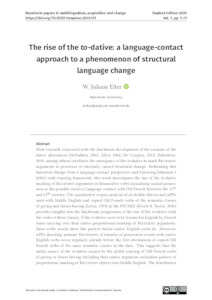|
The rise of the to-dative: a language-contact approach to a phenomenon of structural language change
Elter, Wiebke Juliane
![[img]](https://madoc.bib.uni-mannheim.de/53747/1.hassmallThumbnailVersion/121-Article%20Text-305-2-10-20200129.pdf)  Vorschau |
|
PDF
121-Article Text-305-2-10-20200129.pdf
- Veröffentlichte Version
Download (374kB)
|
|
DOI:
|
https://doi.org/10.25521/mapmac.2020.121
|
|
URL:
|
https://madoc.bib.uni-mannheim.de/53747
|
|
Weitere URL:
|
https://majournals.bib.uni-mannheim.de/mapmac/arti...
|
|
URN:
|
urn:nbn:de:bsz:180-madoc-537478
|
|
Dokumenttyp:
|
Zeitschriftenartikel
|
|
Erscheinungsjahr:
|
2020
|
|
Titel einer Zeitschrift oder einer Reihe:
|
Mannheim Papers in Multilingualism, Acquisition and Change
|
|
Band/Volume:
|
1
|
|
Heft/Issue:
|
Student edition
|
|
Seitenbereich:
|
1-71
|
|
Ort der Veröffentlichung:
|
Mannheim
|
|
Verlag:
|
Universität, LS Anglistik/Linguistik (Diachronie)
|
|
Sprache der Veröffentlichung:
|
Englisch
|
|
Einrichtung:
|
Philosophische Fakultät > Anglistik IV - Anglistische Linguistik/Diachronie (Trips 2006-)
|
|
Lizenz:
|
 Creative Commons Namensnennung 4.0 International (CC BY 4.0)
Creative Commons Namensnennung 4.0 International (CC BY 4.0)
|
|
Fachgebiet:
|
400 Sprache, Linguistik
|
|
Freie Schlagwörter (Englisch):
|
dative alternation , argument structure , Middle English , ditransitive , contact , code-copying
|
|
Abstract:
|
Most research concerned with the diachronic development of the variants of the dative alternation (McFadden, 2002; Allen, 2006; De Cuypere, 2015; Zehentner, 2018; among others) attributes the emergence of the to-dative to mark RECIPIENT arguments to processes of internally caused structural change. Rethinking this historical change from a language contact perspective and following Johanson's (2002) code-copying framework, this work investigates the rise of the to-dative marking of RECIPIENT arguments of ditransitive verbs lexicalising caused possession as the possible result of language contact with Old French between the 11th and 15th century. The quantitative corpus analysis of all double objects and to-PPs used with Middle English and copied Old French verbs of the semantic classes of giving and future having (Levin, 1993) in the PPCME2 (Kroch & Taylor, 2000) provides insights into the diachronic progression of the rise of the to-dative with the verbs of these classes. If the to-dative were to be licensed in English by French loans carrying over their native prepositional marking of RECIPIENT arguments, these verbs would show this pattern before native English verbs do. However, to-PPs denoting animate RECIPIENTS of transfer of possession events with native English verbs occur regularly already before the first attestations of copied Old French verbs of the same semantic classes in the data. This suggests that the initial source of the to-dative cannot be the global copying of Old French verbs of giving or future having including their native argument realisation pattern of prepositional marking of RECIPIENT objects into Middle English. The distribution of the alternation's variants across time, texts and verb origin provide new insights into the diachronic progression of the emergence of the dative alternation in English.
|
 | Dieser Eintrag ist Teil der Universitätsbibliographie. |
 | Das Dokument wird vom Publikationsserver der Universitätsbibliothek Mannheim bereitgestellt. |
 Suche Autoren in Suche Autoren in
Sie haben einen Fehler gefunden? Teilen Sie uns Ihren Korrekturwunsch bitte hier mit: E-Mail
Actions (login required)
 |
Eintrag anzeigen |
|
|
 ORCID: 0000-0001-9476-333X
ORCID: 0000-0001-9476-333X



 Creative Commons Namensnennung 4.0 International (CC BY 4.0)
Creative Commons Namensnennung 4.0 International (CC BY 4.0)
 Suche Autoren in
Suche Autoren in